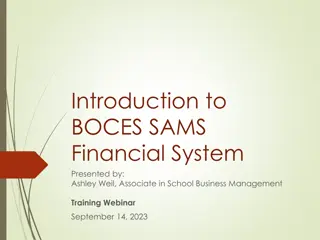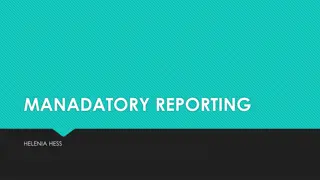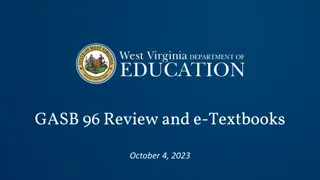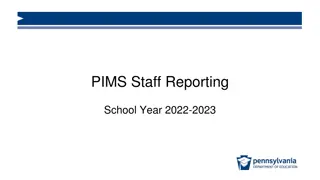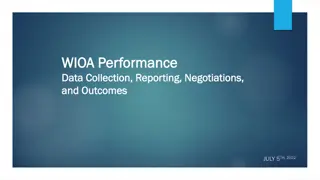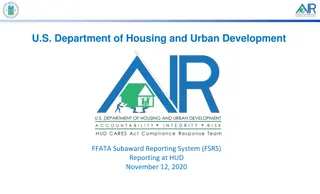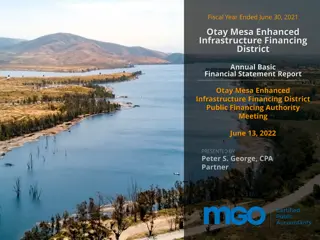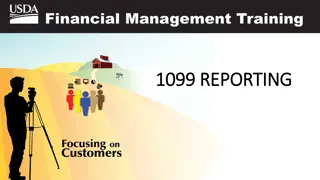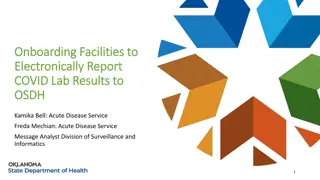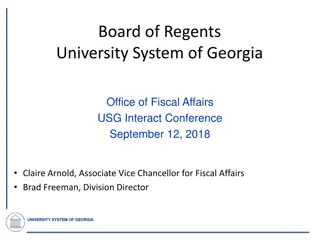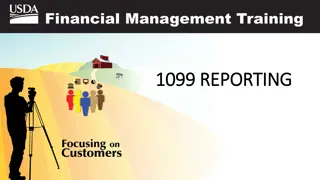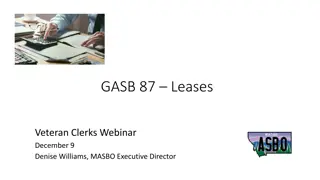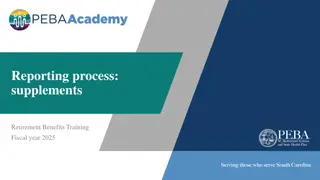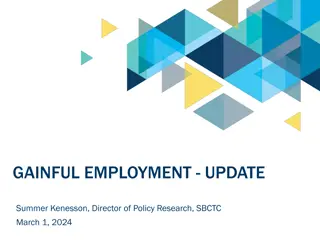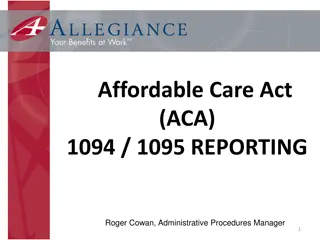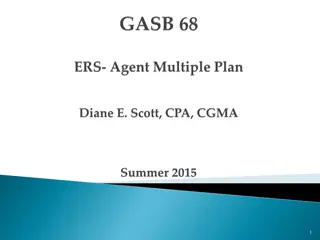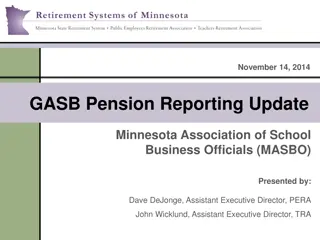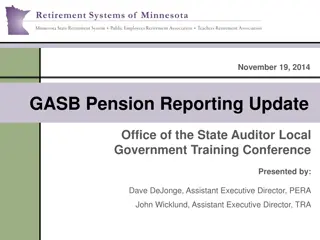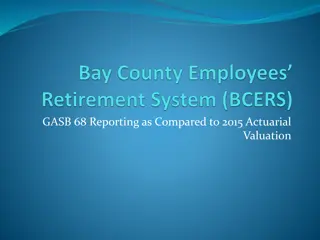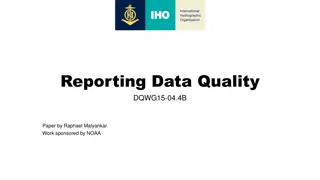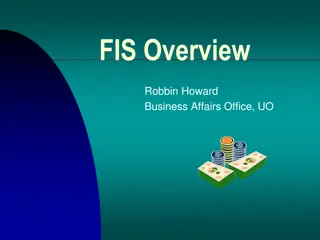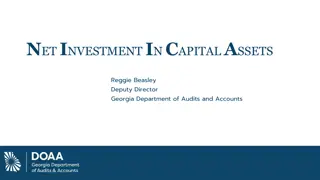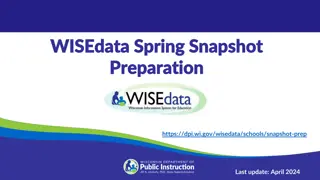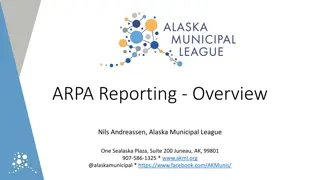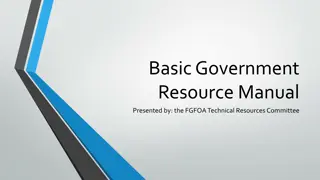ECC Social Value Reporting and Evaluation Framework
Essex County Council (ECC) has implemented a robust Social Value Reporting and Evaluation framework based on the Local Government Association's National TOMs method. This framework categorizes and assesses social value contributions in two parts - Value Score and Supporting Statement Score - to deri
3 views • 16 slides
Importance of Integrating Sustainability Reporting in Government Accounting
Sustainability reporting in government accounting in Africa promotes transparency, supports Sustainable Development Goals, attracts investments, manages resources, enhances efficiency, and fosters partnerships. The role of government accounting is crucial for transparent and sustainable governance t
3 views • 9 slides
Annual ST-3 Training for School Districts - GASB 96 Updates Fall 2023
This training program covers GASB 96 updates, General Fund Transfers, NRT updates, BOCES Expenditure Reporting, and filing ST-3 for school districts. GASB 96 focuses on Subscription-Based Information Technology Arrangements (SBITA), defining short-term and long-term contracts and how to account for
1 views • 76 slides
Overview of Fall 2019 Reporting Information Session
High-level overview of TRS reporting for Fall 2019 including legislative changes, summary of rate changes for fiscal years, tips on starting a new year, and additional reporting tips. The presentation emphasizes the importance of accurate reporting and compliance with TRS Laws and Rules. Ensure time
1 views • 29 slides
Introduction to BOCES SAMS Financial System Training Overview
This training session, presented by Ashley Weil, covers important topics such as GASB 96 guidance, SA-111 process, Federal Funding reminders, State Aid procedures, submitting BOCES State Aid claims, revising data in SAMS, understanding BOCES SAMS Financial Reports, and meeting submission deadlines.
4 views • 130 slides
Mandatory Reporting Guidelines for Suspected Child Abuse/Neglect
Understanding mandatory reporting requirements for child abuse and neglect is crucial for various professionals and individuals working with children. This content emphasizes the legal obligations and procedures involved in reporting suspected cases, ensuring immunity for those reporting in good fai
1 views • 6 slides
GASB 96: Subscription-Based Information Technology Arrangements (SBITAs) Overview
GASB 96 provides guidance on accounting for subscription-based information technology arrangements for government end users. It outlines criteria for determining control of IT assets, distinguishes SBITAs from leases, and explains the recognition and measurement of subscription liabilities and asset
0 views • 26 slides
Comprehensive Overview of PIMS Staff Reporting for School Year 2022-2023
Offering insights into PIMS Staff Reporting agenda, reasons for data reporting, roles of EL Coordinators, and details on Professional Staff reporting criteria and templates. The content covers federal reporting requirements, Equitable Access data, and trends in education personnel.
1 views • 39 slides
WIOA Performance Data Collection and Reporting Overview
Requirements for reporting under the WIOA program, including data collection, negotiations, and outcomes reporting. Details on the reporting periods, reporting entities, core programs, partners, and the individuals included in the Participant Individual Record Layout (PIRL) reports.
6 views • 25 slides
Understanding FFATA Subaward Reporting System (FSRS) at HUD
FFATA requires federal award information to be publicly available on a searchable website. FSRS is a reporting tool for prime awardees to report sub-recipient/contractor awards and executive compensation data. This article delves into FFATA requirements, FSRS roles, responsibilities, and reporting p
2 views • 15 slides
Otay Mesa Enhanced Infrastructure Financing District Public Financing Authority Meeting Summary
The Otay Mesa Enhanced Infrastructure Financing District Public Financing Authority meeting held on June 13, 2022, discussed various agenda items including audit responsibilities, financial statements, upcoming GASB pronouncements, and audit standards. The responsibilities and deliverables of the au
2 views • 8 slides
Understanding 1099 Reporting Guidelines and Systems
The article provides insights into the 1099 reporting process, including details about the Miscellaneous Income System (MINC), Form 1099 issuance, criteria for 1099 reporting, the Statement of Earnings System (EARN), and the Special Payroll Processing system (SPPS). It explains the responsibilities
2 views • 15 slides
Streamlining Electronic Reporting of COVID Lab Results to OSDH
This documentation outlines the process of electronically reporting COVID lab results to the Oklahoma State Department of Health (OSDH). It covers the purpose, available options, specifications, formats, and the onboarding and testing process, aiming to accelerate the reporting of healthcare facilit
0 views • 9 slides
Understanding GASB Statement 83: Asset Retirement Obligations
GASB Statement 83 standardizes the recognition and measurement requirements for asset retirement obligations (ARO) to enhance financial reporting consistency. Governments must recognize AROs when liabilities are incurred and reasonably estimable, based on external and internal obligating events. Mea
0 views • 30 slides
Overview of 1099 Reporting Systems
The 1099 Reporting Systems consist of MINC, EARN, and SPPS, which are used for IRS 1099 reporting purposes. These systems handle transactions and generate Form 1099 for recipients based on predefined criteria. Taxpayers are responsible for accurate reporting to the IRS, with reporting thresholds set
0 views • 15 slides
Hemp Acreage Reporting & Certification Q&A with USDA
Explore essential information about Hemp Acreage Reporting, Certification, and compliance procedures in this Q&A session with the Farm Service Agency (USDA). Learn about important deadlines, required documentation, and the significance of reporting accuracy for various programs. Discover how to file
0 views • 15 slides
UNEP Support for Improving UNCCD Reporting Procedures
UNEP has been providing support since 2010 to enhance the reporting processes of the UNCCD, focusing on streamlined funding approaches, technical assistance, and capacity building. Key outcomes include the development of reporting tools, online reporting systems, and building credible data from coun
0 views • 14 slides
Understanding GASB 87 Leases: Key Information and Implementation Guidelines
This informational material focuses on GASB 87 Leases, covering aspects like the definition of leases, exclusions, accounting treatments, and implementation steps for government entities. GASB 87, issued in 2017, aims to enhance accounting and financial reporting for leases by governments through a
0 views • 23 slides
Climate Change Monitoring, Reporting, and Verification (MRV) Training Session Overview
This document outlines the purpose and reporting requirements for the development of a Climate Change Monitoring, Reporting, and Verification (MRV) system, focusing on projections and scenarios. It highlights the importance of collecting information for climate mitigation, assisting Serbia in meetin
0 views • 19 slides
Transitioning to Incident-Based Crime Reporting: Enhancing Transparency and Accountability
Anytown Police Department (APD) is leading the transition from Summary Reporting to Incident-Based Reporting through the National Incident-Based Reporting System (NIBRS). This change promotes transparency, provides detailed crime data to the public, and improves statewide and national crime statisti
3 views • 17 slides
Insights into Structured Reporting Practices in Colorectal Cancer Imaging
A survey conducted by Dr. Eric Loveday at North Bristol NHS Trust revealed the current landscape of structured reporting in MRI and CT scans for rectal and colon cancer. Results indicate a positive outlook towards implementing national standards for structured radiology reporting, with an emphasis o
0 views • 7 slides
Employee Benefits Reporting and Training Procedures for Fiscal Year 2025
The reporting process for retirement benefits in fiscal year 2025 includes supplements, employer reporting representatives, supplemental contribution reporting, service reports, furlough supplements, and a disclaimer. Employers can find detailed instructions on submitting various forms through the E
0 views • 6 slides
Streamlining Gainful Employment Reporting Process for Title IV Programs
Gainful Employment reporting requirements for Title IV programs involve historical uploads, student data submissions, and a detailed workplan by SBCTC to assist colleges in meeting compliance. The reporting burden includes annual updates and student-level data reporting. SBCTC's workplan aims to red
0 views • 16 slides
Affordable Care Act (ACA) 1094/1095 Reporting Guidelines
Affordable Care Act (ACA) requires employers to report information to the IRS regarding individual and employer responsibilities under the ACA. The reporting includes details on individual responsibility, employer responsibility, exemptions, and reporting requirements for different types of employer
0 views • 52 slides
Understanding GASB OPEB Changes in Public Sector Health Care Benefits
GASB has introduced new standards for OPEB plans, similar to GASB 67/68 for pensions. The changes impact reporting and liabilities, requiring a blended discount rate and Entry Age Normal method. Employers must now carry the Net OPEB Liability on their balance sheets and provide extensive disclosures
0 views • 18 slides
Understanding OPEB Requirements and Accounting in School Finance
OPEB, or Other Postemployment Benefits, are benefits received by retired employees earned during their careers. GASB Statements 45, 74, and 75 provide guidelines for reporting and accounting for OPEB in school districts. Compliance with GASB 75 is mandatory for all districts to determine OPEB liabil
0 views • 35 slides
Financial Reporting Changes for Employer Retirement System
Transition to the new employer portal, requirements for employer portal design, audit approach memo, GASB Statement 68 report details, government employer participation issues, net pension liability reporting, and fiduciary net position changes are highlighted in this collection of information for p
0 views • 40 slides
GASB Pension Reporting Update for Minnesota - November 14, 2014
GASB updates impacting PERA and TRA pension reporting in Minnesota, including GASB 67 and 68 changes, implications for school districts and employer units, and major reporting changes affecting net pension liability.
0 views • 35 slides
GASB Pension Reporting Update and Implementation Insights
GASB updates and implementation guidelines for pension reporting as of November 19, 2014, presented at the Office of the State Auditor Local Government Training Conference. The update covers reporting deadlines for PERA and TRA, actuarial valuation reports, GASB Statement 68 impact on employer units
0 views • 41 slides
GASB 68 Reporting and Actuarial Valuation Comparison
GASB 68 reporting as compared to the 2015 actuarial valuation focused on the implementation of GASB 68 for financial statements, including the reporting of entities like the Bay County Employee Retirement System and Bay-Arenac Behavioral Health. The process involved providing information on pension-
0 views • 9 slides
Data Quality Reporting in Distribution Chain
Data Quality Reporting in the distribution chain is crucial for evaluating and ensuring the quality of exchanged data sets. This paper by Raphael Malyankar sponsored by NOAA discusses the importance of reporting data quality results, the stages in the production/distribution chain where reporting is
0 views • 15 slides
Financial Management Overview at University of Oregon
Financial management at the University of Oregon involves various aspects including fund accounting, chart of accounts, proper resource allocation, and reporting standards set by GASB. Funds are classified into different types based on their sources, limitations, and characteristics. The university
0 views • 17 slides
Understanding Net Investment in Capital Assets and Its Importance
Net Investment in Capital Assets is a critical component of an entity's financial position, reflecting the value of capital assets owned. It represents the portion of the net position that is not spendable as it is invested in assets. Calculating Net Investment in Capital Assets involves subtracting
1 views • 17 slides
Simpler Systems Reporting Pilot for Financial Data Enhancement
The Simpler Systems Reporting Pilot is underway to enhance financial data reporting at the university campus. Led by Vice President Ryan Nesbit's team, this initiative aims to improve University-wide financial reporting mechanisms and accessibility to data through the Simpler tool. The pilot include
0 views • 5 slides
Overview of WISEdata Snapshot Preparation and Reporting Requirements
The WISEdata Snapshot Preparation provides crucial details on data entry, validation, and reporting processes for educational institutions. It outlines the importance of accurate data collection for federal reporting, public reporting, and funding determinations. Additionally, the Snapshot Reporting
0 views • 41 slides
Ensuring Chemical Reporting and Preparedness at the DEQ
The Chemical Reporting and Preparedness section at the DEQ focuses on regulations under EPCRA, prompted by incidents like the Bhopal tragedy. EPCRA covers Tier II reporting, spill reporting, LEPCs, State Emergency Response Commission, and Oklahoma Hazardous Materials Emergency Response Commission. T
0 views • 17 slides
ARPA Reporting Overview and SLFRF Guidelines in Alaska
This document outlines the reporting overview for the ARPA (American Rescue Plan Act) and specific guidelines for the Coronavirus State and Local Fiscal Recovery Fund (SLFRF) in Alaska. It covers acceptance, use, and reporting of funds, as well as designating staff roles for managing reports. The co
2 views • 22 slides
Comprehensive Guide to Government Financial Management
This comprehensive guide, presented by the FGFOA Technical Resources Committee, covers topics such as accounting principles for local governments, annual financial audits, financial reporting, budgeting, and capital assets valuation rules. It explains the importance of audits in maintaining public t
0 views • 31 slides
Feedback Analysis on Medication Incident Reporting in Hospitals
Feedback received from IMSN members on NIMS and incident reporting revealed various issues affecting the rates at which staff report medication incidents/near misses within hospitals. Major themes included staffing numbers and turnover, pharmacist involvement in incident reporting, clinical pharmacy
0 views • 12 slides
Importance of Wildland Fire Reporting to the Fire Community
Wildland fire reporting plays a critical role in providing accurate data for effective fire management. Defined state fires and challenges in reporting impact funding, risk management, and agency support. Comprehensive reporting like the Wildland Fire Occurrence Reporting for Massachusetts is essent
0 views • 6 slides




